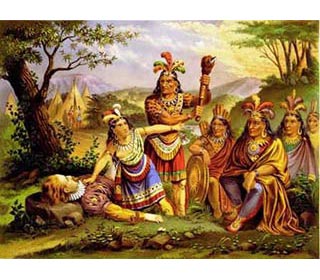In 1612, she was seized as a hostage by the English, and she later converted to Christianity and married the English colonist John Rolfe. The following fact sheet contains interesting facts, background history and information about the life of Pocahontas and the events in history that led to his fame as a great Native American Indian leader. Fast Facts about Pocahontas Tribe: Powhatan
Lifespan of Pocahontas: 1595 - 1617
Place of Birth: Werowocomoco, Virginia
Date of Birth: 1595
Date of Death: March 1617
Place of Death: England. She was buried on March 21, 1617, St George's Church, Gravesend, Kent, England
Name of Father: Chief Powhatan
Children: Kocoum; Thomas Rolfe Pocahontas and Captain John Smith
The story of Pocahontas started when the English settled in Jamestown in 1607. Pocahontas’ father, Powhatan, captured Captain John Smith but during the process of the captain’s execution, Pocahontas saved him. After that time, Chief Powhatan would send food to the starving Americans. Pocahontas was sent to the Englishmen to negotiate the release of the Powhatan prisoners in which she was successful. As years passed by, the relationship between the English and the Powhatan tribe deteriorated. Chief Powhatan passed a policy to refuse any English trading due to the drought. The tribe had less food to give as the Americans were too demanding. The English burnt and threatened their tribes if their needs were not met. The Powhatan Wars begin
In 1609 tensions between the Native Indians and the English colonists increased and Powhatan reduced trade attempting to starve the colonists out. Attacks were made on the colonist's fort and the First Powhatan War (1609 - 1614) erupted. The period covering the next 2 years (1609-1610) would become known as the 'Starving Time' by the colonists. Pocahontas and John Rolfe
In 1613, Pocahontas was captured enabling the colonists to increase their demands from Chief Powhatan. Powhatan needed to secure the release of Pocahontas so he met with the English in the fort and brought with him the guns the tribe had taken from the other English settlers. Chief Powhatan failed to meet all the demands of the colonists so Pocahontas remained their captive. However, in April 1614 Pocahontas married English tobacco planter John Rolfe and peace returned between the warring factions. The First Powhatan War (1609 - 1614) was over. The Death of Powhatan
The marriage between Pocahontas and John Rolfe brought peace to both groups. She converted to the Christian religion and when she was baptized, she took the name of Rebecca. Pocahontas and John Rolfe had a son named Thomas Rolfe. In 1616 she accompanied her husband on a visit to his home in England. Pocahontas was extremely popular with the English and she met with the highest in the land including Queen Anne and King William who showed her the greatest respect. When she was ready to sail for home, she contracted tuberculosis and died. She was buried on March 21, 1617 at St George's Church, Gravesend, Kent, England. Facts about Pocahontas
Find some more important information and interesting facts about Pocahontas. | 